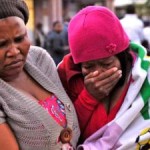Who is the stranger in our midst? Ask the police.
There was a protest, a service delivery protest, on Wednesday in Setseto, outside of Ficksburg, in the eastern part of the Free State, in South Africa. During the protest, Andries Tatane, a 33 year old activist, approached the police. Either he approached the police to plead for some consideration for an elderly man who was not part of the protest or he approached the police to ask them to stop using water cannons because there were elderly people in the protest. Tatane was shirtless, unarmed, unthreatening. About six or seven riot police attacked him, beat and kicked him. Then Andries Tatane was shot. Finally he collapsed, and died, 20 minutes later. By the time the ambulance arrived, Andries Tatane was dead, and the mourning, and outrage, had begun.
There was a protest, a student protest, on Monday in Kabale district, in southwestern Uganda. Students at Bubaare Secondary School went on strike, protesting a policy shift affecting the disposition of male and female students. During the protest, Judith Ntegyerize, a senior, walked by, on her way to classes. The riot police showed up just then, allegedly shot their rifles in the air, and a `stray’ bullet hit Ntegyerize in the head and killed her, instantly.
These are only two stories, only two stories from the past week. In the past year, there have been similar stories of unarmed innocents killed by police fire everywhere. Around the world there are murals to the martyrs, more often than not young women and men, such as Oscar Grant, in the United States, or Neda Agha-Soltan in Iran, or the young women and men killed by live fire in protests in Yemen, Syria, Bahrain, Egypt. Sometimes, their names become known, more often they remain anonymous. Sometimes, the State apologizes, but usually it just spins.
Whenever police are armed with live bullets and sent to a protest, the State has decreed that deadly force is an acceptable means to an end. But what is the end? It is the identification of the strangers, the strangers in our midst. Only the strangers can be so blithely beaten, kicked, shot, disposed of, dumped like so much garbage, killed. That is the nation-State’s rule of law, the law that protects `citizens’ against the threat, the pathogen, of strangers.
In a poem entitled “Passover”, Primo Levi enjoined us, all of us, to “light the lamp, open the door wide so the pilgrim can come in”. That poem ends with these words: “This year in fear and shame, next year in virtue and in justice.” Open the door, open it wide, and when you do, remember Andries Tatane and Judith Ntegyerize. Remember. The dead shall not walk through those open doors.
